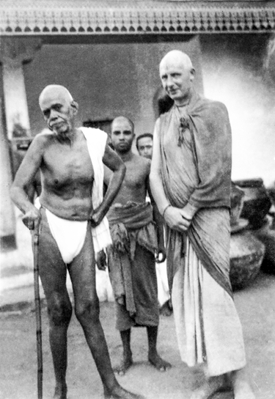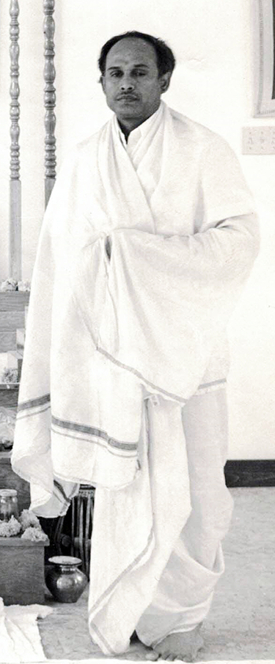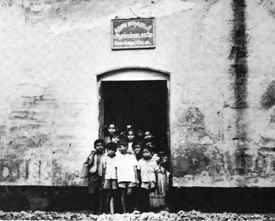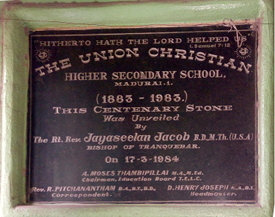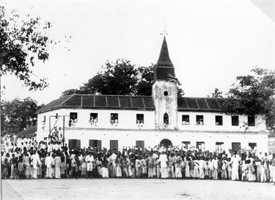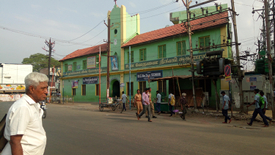Sri Krishnaprem's 1948 Visit to Sri Ramana Maharshi
Many have read Dilip Kumar Roy’s description of Sri Krishnaprem’s visit to the Maharshi. The following narration appears to be a far more detailed and credible account than any of the others previously published. It was written by the Bengali devotee who arranged Krishnaprem’s South Indian pilgrimage and enumerates the many ways in which Bhagavan singled out Sri Krishnaprem to extend his grace. While engaging, the author presents us with genuine insight into the intriguing personality and devotional character of a Western devotee who embraced orthodox Vaishnavism and yet, by the intensity of his devotion, was enabled to experience the essence of Bhagavan’s true nature.
In 1948, when I was staying at Ramanasram, I got a letter from Gopalda (Sri Krishna Prem). He wrote to say that all his previous plans to come South went wrong for one reason or another. Now that I was staying at Tiruvanamalai, Gopalda said that he would like to come for Ramana Maharshi’s darshan, and then would proceed to Pondicherry for Sri Aurobindo’s darshan. From there he intended to visit a few other pilgrim spots. He mentioned the date of his arrival at Madras and asked me to meet him at the station.
I was then occupying a couple of outhouses with thatched roofs, attached to the pukka building of Dr.Syed. As Dr.Syed was then away and the keys of the house were left with
Miss Merston, I contacted her and kept one room ready for Gopalda’s sojourn. I said nothing about Gopalda’s intended visit to anyone. The only person who knew was, of course, Miss Merston.
The evening I left for Madras I made my obeisance to the Maharshi, just after the evening chanting of passages from the Vedas and Upanishads, and begged his permission to leave for Madras. I would repeat that I gave no reason for my intended visit to Madras, no, not even to the Maharshi. As usual, the Maharshi nodded and said ‘seri po’ (All right. Go.). I was waiting on the platform for 'The Mail' train to arrive from Calcutta on the scheduled date. In due course, Gopalda alighted from his compartment and was joined by one Upadhyaya who was then attached to the Rice Research Centre in Orissa and had boarded the train at Cuttack. He accompanied Gopalda to Ramanasramam and was with us during Gopalda’s trip to South India.
At this point, Tapo Gopal Mukherjee, Postmaster General of Madras, came to meet Gopalda. He was the son of Pran Gopal Mukherjee, elder brother of Govinda Gopal, and cousin of Mohananda Brahmachari. He was to have been Gopalda’s host at Madras, but he said he was staying in a hotel because no quarters were yet available to him. Of course he said he had reserved accommodation in the hotel, but Gopalda told him he could not possibly stay in a hotel.
An impasse ensued. Gopalda turned to me and asked if I knew anyone in Madras with whom he could stay for a day or two. It so happened that I knew no one in Madras. However, there was one exception. When I used to meet Mantu mama (Dilip Kumar Roy of Pondicherry) in Madras, we would put up with the Guptas – Mr. Gupta then being the Income-tax Commissioner - but they had left Madras. There was yet another Bengali couple whom Dilip would visit whenever he was in Madras.
I thought of this couple, but there was a big snag: the couple were not married, and the lady, Niharbala, used to be on the stage. However, they were attached to Aurobindo Ashram. I took Gopalda aside and informed him about this arrangement. When he heard that they were devotees of Sri Aurobindo, Gopalda did not hesitate and asked me to take him to their house. So we left for their residence in Tapo Gopal’s station wagon.
When we got there, I asked Gopalda and the others to wait while I went to see the lay of the land, for I confess that I was feeling rather uncomfortable. When I came to the house, I found Niharbala impatiently walking up and down the veranda, and the moment she saw me she asked if ‘the Mahatma’ had come. It was my turn to be surprised. She explained that they had got the news of Gopalda’s coming from Dilip and that Mr. Ghosh (I hope I have got the name right) had gone to the station to meet ‘the Mahatma’ and to bring him there. When I told her that Gopalda was waiting at the gate, she ran past me and prostrated herself in the dust at the gate. So all appeared to be going well, and I heaved a sigh of relief.
Niharbala showed Gopalda the bedroom and explained that everything — the pillowcases, the bed sheets — was brand new. She further told us that she had had the room scrubbed and washed with Ganges water — obviously brought from Calcutta. When I asked her why she went to the trouble of doing all this when Gopalda was not meant to come there, she said she had been praying to Sri Aurobindo, from the moment she got Dilip’s letter, that ‘the Mahatma’, namely Gopalda, might be directed to come and stay there. By then Mr. Ghosh rushed back from the station and was overjoyed to find Gopalda actually staying with them. He explained that he missed us at the station because the train had arrived before time.
So far, all’s well that ends well. But another snag was about food. Gopalda told us he could take food only if it was cooked by a Brahman or a Vaishnava, otherwise rice and dal were forbidden. Gopalda then turned to me and ordered me to go and have my bath and then to cook the food. I vehemently protested and told him I had never cooked before. However, our hostess asssured me that I had no reason to worry. She would do all the preliminary chores, and all I would be called on to do was to put the rice, vegetables, etc. into the Icmic cooker, bought especially for such an eventuality, and to take them out when cooked. But the real trouble was yet to come. One has to cook the boiled dal and to put in the ‘phoron’ or ‘sambarak’. Our hostess put the karahi (cooking dish) onto the fire and then I had to pour a little oil or something in the pan, and then add the masala (spices)... and then the dal.
Believe me, I was fuming with rage. While going through this ordeal, Gopalda and the others were enjoying ‘dolce-far-niente’. The most unkindest cut of all (Shakespeare’s double superlative) was Gopalda’s verdict; he remarked that I was not such a bad cook after all. Should I ever need a job in the future, I could easily apply for.... It was great fun, indeed. I narrate this incident in detail as it shows what a fine sense of humour Gopalda possessed.
I would like to digress here a little and give another such example of many instances. When I first met Gopalda at Mirtola, I kept using the word ‘Sir’ whenever I spoke to him. Soon afterwards, Gopalda took his pipe out of his mouth and said in a solemn voice, ‘If you go on “Sirring” me I shall start “Madaming” you, or words to that effect. I give these instances intentionally because I shall connect them with a later episode.
We stayed a couple of days at Madras where, among other places, Gopalda visited the Theosophical Society’s centre at Adyar, being taken there and back by Tapo Gopal Babu.
Ramanasramam
The day soon came for our trip to Tiruvanamalai. Mr.Ghosh insisted on getting the three tickets for us, namely, Gopalda, Upadhyaya and myself. We duly arrived late one evening at Tiruvanamalai station and took a jatka (a type of bullock cart drawn by a horse) to Ramanashram.
Immediately on getting down from the train, I noticed a totally unexpected change in Gopalda. He looked grave and solemn, and even appeared reluctant to reply to my questions. He just said yes and no, or just shook his head. When we reached our destination it was quite dark. Gopalda dumped his two bundles and asked to be taken to the Maharshi.
(In one bag he was carrying his Radha Krishna murtis in a wooden box which, he later told the Maharshi, he himself had made. In the second bag was his wearing apparel - the sadhu’s ochre-coloured dhoti, etc.)
`
I have to say I was feeling unhappy on account of his seeming taciturnity, and was wondering whether I had done something to bring it about. I consulted Upadhyaya who said he had never known chhotoba (little father, the form of address used by Moti Rani ) to be so silent. He, too, kept wondering at the change. We three started off for the ashram which was only a few minutes walking distance away.
Instead of taking the main approach by the side of the office room, I took the straight alleyway which passes between the office room and the dining hall. From where the Maharshi sat in the verandah, one could immediately see anyone who stepped into this alley. I should also explain that the Maharshi hardly ever looked at those who gathered round him. Most often he would just be sitting there, merged in trance, or, alternatively, sat looking at - what? Space? The hill? The sky? Or nothing? But the moment Gopalda stepped into the alley, Ramana turned fully and kept staring with those sparkling eyes of his at Gopalda.
We went up to his seat, and I bowed down with my forehead touching the ground. Then I looked up and started to tell him about Gopalda who was lying prostrate before his seat. But the Maharshi stopped me short by waving his anga vastra ( or anga baran, a cloth commonly worn over the shoulder in south India) impatiently and invited Gopalda to sit near the stone couch on which he was sitting. Here I must explain that no one was allowed to sit so close to the Maharshi. I also got the impression from the Maharshi’s behaviour that he already knew Gopalda, so that a formal introduction was not necessary.
Then Ramana sent someone to call Sadhu Arunachala (Major Chadwick, who had been staying at the ashram for many years). He also directed those in charge of the dining hall to prepare something without chilli for Gopalda, and also to arrange for milk. For the few days Gopalda stayed at the ashram he was always given the first seat at meals, just in front of the Maharshi’s seat, so that the Maharshi could see and give necesary instructions about the food prepared for and served to Gopalda.
All this time, Gopalda sat with his head bowed. His face appeared to me to be extraordinarily red or flushed. Then I witnessed a peculiar incident: Gopalda suddenly jerked his head up and looked at the Maharshi, who was seemingly unconcerned. Again Gopalda bowed his head. Then the Maharshi asked me what arrangements I had made for Gopalda’s stay. And he then indicated that, as supper time was drawing near, Gopalda might like to go back and have his bath.
We got up, and then Gopalda exchanged a few words with Chadwick near the well, and we walked back to Dr.Syed’s place. Gopalda fell silent again and seemed to be in a sort of deep thought. I left instructions that the bath should be filled with water, but Gopalda refused to bathe in that water and asked me to draw fresh water from the well. He had a hurried bath, and lit an agarbatti (incense stick) before the images of Radha Krishna, and then we trooped back to the ashram for supper.
When we came to the dining hall, we found the Maharshi waiting there for Gopalda. We had supper and returned to our place. Gopalda was deep in thought and kept pacing the verandah in silence. After a little while I summoned up enough courage to mutter about preparing his bed. He stopped for a moment and said that we need not bother about him, that he would go to bed when he felt sleepy, and that we should retire.
I was utterly bewildered and knew not what to think of his completely changed behaviour. Upadhyaya and I waited a little longer. Gopalda was still walking up and down the verandah. Then Upadhyaya spread his blanket on the floor and I went back to my room which was just behind the one intended for Gopalda’s use. I whispered to Upadhyaya that he should call me if necessary. I just did not know what I could or should do. I had a very disturbed night and was up at the crack of dawn to reconnoitre.
I found that Gopalda was also up. I asked Upadhyaya if Gopalda had gone to bed last night, but he could not say, as he had gone to sleep. We drew fresh water from the well, and Gopalda had his bath. Then he got ready to do his puja. I found that he was carrying water from the Ganga, a stick of sandalwood, tulasi leaves, incense sticks, and oil and wicks for a lamp. He suddenly turned to me and asked if I could not get some fresh flowers. Though I knew there was a garden attached to the ashram, I doubted that an outsider like me would be allowed to pick flowers. But I could try.
Just as I stepped out of the room, I found Raja, the ashram Postmaster, with something in his hand. I called Gopalda, and Raja handed him a small packet of fresh flowers in a plantain leaf. Raja said that the Maharshi personally directed the picking of the flowers and sent them by him. For the first time since his arrival at Tiruvanamalai station, Gopalda’s face lost that strained, stern look. It was beaming with a smile. In a choked voice he said: “Indeed, the Maharshi is Bhagavan. He knew what my heart yearned for.” (I must explain that the ashramites and devotees habitually referred to the Maharshi as Bhagawan. In North India this word is used in the sense of God, but in the South it is a term of respect.) I, too, heaved a sigh of relief.
As we arrived for breakfast, we found the Maharshi was again waiting for Gopalda. (Words fail me, and I just don’t know how best to convey what lies deep in my heart.) As a matter of fact, this sort of loving and affectionate respect was bestowed on Gopalda by the Maharshi on each and every occasion.
The Maharshi also arranged for Gopalda to be taken round to see the caves and other places where he had stayed before the ashram was built. Then he was taken to have darshan of the Lingam in the main temple. But the Purohit did not allow him to enter the sanctum sanctorum on the pretext that he was a Yavan, a foreigner. I was amazed at Gopalda’s reaction. He was not at all upset or angry. On the contrary, he endorsed the Purohit’s action. What he said was something like this: “How can a Purohit be expected to know the true character and purpose of a foreigner. Most foreigners indulge in casting aspersions and ridicule and the like.” However, he was shown the pathala lingam, the small enclosure where the Maharshi had spent many days merged in trance, oblivious to the outside world. As he sat there cross-legged for days and weeks, the backs of his thighs had been eaten away by worms.
This was the time for the annual festival called kartikeya dipam. Crowds of pilgrims had gathered to attend the festival and to have the Maharshi’s darshan. When Gopalda returned from the excursion to the temple, we found a huge crowd of pilgrims sitting in the verandah, engrossed in listening to the Maharshi. This in itself was a strange event, for, as I have said, the Maharshi hardly ever spoke to or looked at anyone. Our surprise became boundless when we found everyone looking at Gopalda and smiling and bowing. Later we were told that, breaking from his usual habit, the Maharshi had been narrating at length the story of Sri Krishna’s sojourn in Mathura. And when he came to relate the eventual return of Sri Krishna to Brindaban, it coincided with Gopalda’s return from the outing. This prompted the Maharshi to say something like this: “Ah! There you are. Have I not been telling you about Sri Krishna’s return from Mathura? See. Here returns our Sri Krishnaprem.”
In Memoriam
Devotees of Arunachala Ashrama, both in New York and Nova Scotia, were saddened to receive recent news of the passing of two stalwart devotees who contributed to the establishment and sustenance of Arunachala Ashrama in Bridgetown, Nova Scotia, Canada.
The first was Dr.J.S.S.Lakshminarayana, who was absorbed in Sri Bhagavan on November 8 th , 2018. Since 1974 he regularly performed the pujas and ceremonies at the Ashram, especially those connected with the establishment of Sri Arunachala Ramana Mandiram. His gentle and kind friendship was a constant source of encouragement over many decades.







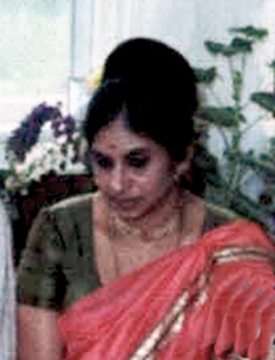
Next was the passing of Srimati Lakshmi Raju on April 7. She and her husband B.K.Raju were two pillars holding aloft the spiritual and cultural heritage of India in Halifax for nearly half a century. Mrs. Raju would regularly arrive early at the Bridgetown Ashram before every major function and organize all the food preparations, besides leading us all in devotional singing. Her inner resplendence, enthusiasm and sincerity lit up and warmed all our hearts.
Both these devotees exemplified the true import of Sanatana Dharma in the West and will be sorely missed.
A Pilgrimage
It began on the morning of Thursday, March 7 th , 2019. After breakfast I took a taxi from Sri Ramanasramam to Tindavanam, the very town our16-year-old sage bought a train ticket to for his journey to Arunachala on August 29 th , 1896. After a 90-minute drive we reached an intersection outside the town where I was to meet up with seven other devotees from the Chennai Ramanalayam Center.
Led by Kumar Raja, the devotee-manager of Ramanalayam, eight of us were to travel to Madurai in a rented van, driven by Ashok, a young man who is, no doubt, the most dexterous driver I have ever encountered in all the years I have visited India. At that rendezvous I joined the van on the first leg of our 5-day pilgrimage.
The van had air conditioning, reclining seats and a home theater media player. Kumar Raja came prepared and we first watched the old, famous Tukaram movie that Dorab Framji showed to Bhagavan in the Dining Hall in 1946. Though we may have seen this film several times, it is difficult not to be moved and inspired by Tukaram’s one-pointed devotion. By the grace of his Lord Panduranga every seeming tragedy in his life resulted in the most miraculous occurrence that demonstrated so clearly the truth of Krishna’s promise in Chapter 9, verse 22 of the Bhagavad Gita:
To those, however, who dwell on Me in single-minded worship I guarantee fulfilment of needs and security.
Absorbed in the life story of Tukaram we briskly traveled along the much-improved highways of Tamiḷ Nadu and reached by evening our first destination, Sri Ramana Mandiram in Madurai.
This is the house where the young boy Venkataraman lived while he attended the Scotts Middle School and then the American Madura Mission High School. It was here in the upstairs room, which was a rooftop room at the time, where, overwhelmed by a sudden fear of death, he searched within one-pointedly to discover what dies and who dies when the body dies. Moments later, from the source of his inner consciousness rose the full awareness of the eternal pure consciousness, the one perfect Self. The boy was no longer a boy. Venkataraman had in one simple, direct dive within realized his true, undying nature, the one Self of all. Then about six weeks later, Arunachala finished the job and drew him unto Itself where he then reigned as the King of Yogis, abiding on the holy throne of Lord Arunachala. This is what happened here 123 years ago, and this is where we all spent the first night of our pilgrimage.
Sri Somasundaram (called ‘Somaji’ by devotees) has been devoutly serving in this Ramana Mandiram for about 50 years. In the 1970s we saw his devoted mother arrive early every morning and sing Sri Ramana Bhagavan’s hymns with unwavering devotion and dedication. Now the Mandiram has two daily programs, morning and evening, attended by a large group of devotees who sing Bhagavan’s hymns, perform arati and distribute prasad.
Also, upstairs, morning and evening, some aspirants gather and sit quietly in the same room where the individuality of the boy Venkataraman died and the Sage, Bhagavan Sri Ramana Maharshi emerged in 1896.
It was a very warm night in the Mandiram. Some of pilgrims slept on the floor and others on the three beds available in the newer upstair rooms.
Bhagavan's Schools
When Bhagavan arrived in Madurai in 1892 to stay with his uncle, he first attended the Scotts Middle School. We had seen this school in 1973, but within ten years we heard that the school building had been razed.
After he attended this school for a couple of years, Venkataraman shifted to the Madura American Mission High School for his 9 th Standard. That was in 1895.
We stopped to see this school en route to our next destination, the Samadhi Shrine of Swami Ramanagiri, a Swedish sadhu-devotee of Bhagavan.
This United Christian Higher Secondary School, as it is now called, was first opened in 1883 and, remarkably, though the name of the school has changed a few times, its outer appearance remains almost unchanged. In 1925, the school ownership was transferred to the Church of Sweden Mission.
The school is only one kilometer from Venkataraman’s uncle’s house – now the Ramana Mandiram. One day in 1895 when Venkataraman was walking to his classes he ran into an elderly relative from Tiruchuzhi. When asked, he told the boy that he had just returned from Arunachala, which threw Venkataraman into an excited state of disbelief that Arunachala was actually a place on earth where one could visit.
Though this is one of the oldest high schools for boys in Madurai, it still appears to be flourishing. The students were just walking in for classes when we arrived. The boys were all well groomed, sporting neat blue shirts and pants – not much like the crowd of boys seen in this school photo from 1895.
Yes, if you are thinking that Bhagavan may be somewhere peering over someone’s shoulder, staring at the photographer in this school photo, you are probably right. It is very likely that he is there. Would any student in 1895 purposely avoid the oportunity to have their photograph taken?
January 20, 1983 - Afternoon - The Ox Cart Pradakshina
With bananas and puffed rice in hand I ran up to the Ashram for an ox cart pradakshina with Kunju Swami, Ganesan and Paul. Climbing aboard, the four of us sat cross legged: Ganesan first, then Kunju Swami, me, and Paul at the back. Side-by-side we bumped blissfully down the road.
Kunju Swami explained how it could be that many of Bhagavan’s direct disciples, apparently out of their mind at the time of death, would be alert and clear in their recollection of Bhagavan. Moreover, they would reassure Ganesan that Bhagavan’s grace was with them and they experienced the awareness of Him within.
The mere contact with Bhagavan was sufficient to awaken Divine Knowledge in a person. Kunju Swami said, “Knowledge of the world is a separate thing, which may be affected at the time of death. The inner awakening might not be apparent during one’s life due to the person’s vasanas. Particularly in one’s last days many vasanas may have to come forth. The mind may become irrational, but it is the finite mind.”
Kunju Swami reassured us, “Don’t think that because you didn’t see Bhagavan in the body that same inner awakening has not occurred to you. It is written, even to think of Arunachala assures one of liberation! But, for thinking of Arunachala, YOU do not get the credit!” He was speaking in a playful, exuberant vein. “No! Arunachala makes the person remember Him. Such is the power and greatness of Arunachala that even the most ignorant person, once having known of it, will have to think at least once a day of Arunachala.”
Kunju Swami continued his encouraging overflow: “Once a person has come to Bhagavan, he cannot escape! In the “Marital Garland of Letters” Bhagavan wrote, ‘I had but thought of you as Arun, and lo! I was caught in the net of your grace. Can the web of your grace ever fail, Oh Arunachala?’ In Tamiḷ, the emphasis here is on the fact that the net of Bhagavan’s grace ‘cannot’ be escaped!”
“I am very happy and content to be caught in the net of His grace,” I said. Kunju Swami laughed.
We began to recite the “Akshara Mana Malai” together, but right at the invocation Kunju Swami stopped and said, “Bhagavan has written, ‘Extend to me your hand of grace....’ One with Arunachala, he addressed the Mountain as His equal! This is most rare. In virtually all devotional hymns, the invocation is a prayer to God for His grace. However, Bhagavan wrote, ‘Extend to me your hand....’ Bhagavan was a real American!”
When we came to the first verse Kunju Swami paused to exclaim, “‘Thou dost root out the ego of those who meditate on Thee in the Heart, Oh Arunachala’ – all of Bhagavan’s teaching is contained in the first verse!”
Sri Arunachala glowed in the light of dusk. The road was completely deserted and we were free to let our praise of Arunachala rise from the Heart.
Approaching the town we stopped singing and passed quietly through the village. “There is no hymn like “Akshara Mana Malai,” Kunju Swami said, “Bhagavan has compared it to the Vedas. Generally, the Vedas are listened to for the vibration of the sound. “Akshara Mana Malai” is similar. In this hymn, we press our demands on Arunachala; we are on familiar terms with Arunachala! Bhagavan wrote the hymn as a woman to a man, Arunachala. See how clever he is! In the end he says, ‘Although I have exposed You, You are My Lord! You must be gracious and accept me!’”
Outside of the town our singing resumed. As our ox cart slowed atop Bhagavan’s bridge we saw the large orange ball of the sun setting between the trees lining the road we had just traveled. With the horizon a bright pink and the crescent moon directly overhead, in the cool, blue sky, it was a sight of divine beauty. Knowing this to be our last pradakshina, I drank in the scene with my eyes. Kunju Swami said, “In New York, you will not see the sunset.”
“I was just thinking the same thing,” I said, “I was just thinking that I will have this to be my sunset for the next five years.”
We stopped and ate our fill of puffed rice, bananas, peanuts and candy and resumed our way. We also resumed our singing of the “Marital Garland of Letters”. The mountain was now a dark silhouette against a golden and pink sky radiant with light. It deepened to pink, purple and then darkness as we jangled down the road in our ox cart concert.
“Kunju Swami does not like that you have said ‘for the next five years,’” Ganesan relayed to me.
“What should I say then?” I asked.
“Kunju Swami says you will come back sooner, and when you come back you will be a Tamiḷ pundit!”
As our ox cart came up the road facing Skand- asramam, Kunju Swami reminisced, “Bhagavan used to come up this road. The houses at night would be lit up, the doors and windows open, and people would be quiet, just like this. ‘This is like the turiya state,’ Bhagavan would say, ‘All the doors of the senses are wide open, and yet the mind is quiet.’”
When we arrived back at the Ashrama Kunju Swami remarked we had done tapasya, laughing, as he stretched his legs to climb out of the cart. For me, this was anything but tapasaya, or so I thought!
Over dinner in Paul’s room Kunju Swami told us two stories about the competition between someone and the sage Vasiṣṭha. In each contest the humility of the sage Vasiṣṭha brought him victory. The first was a competition to feed 1,008 people ‘beneath’ one’s own station. In the second the challenge was to see who could bring the sun nearer the earth by virtue of his tapasya. The former contestant recited the various places where he had done intense tapasya and described his penances. Then, on the strength of his tapasya, he called the sun to come nearer. The sun advanced one mile. The sage Vasiṣṭha pondered deeply. He thought, ‘I am a grihastha, I’ve done no penance to speak of, but once coming through the woods I stopped a while to hear the Vedas recited and expounded. This, I will consider my penance.’ So thinking, he called on the sun to come near. The sun came down to earth, causing everyone to scatter. The immaculately pure wife of the sage, Arunditi, was unaffected, however. She hid the sun under her sari, then sent it back to heaven.
The point of the story, Kunju Swami concluded, is that you never need feel you have done no penance, for you have gone round Arunachala, thinking and talking of Bhagavan! If anyone ever challenges you and asks what tapasya you have done, you can say you have done the greatest tapasya, giri pradakshina! There is no tapasya greater than this!
[1] view the collated articles




